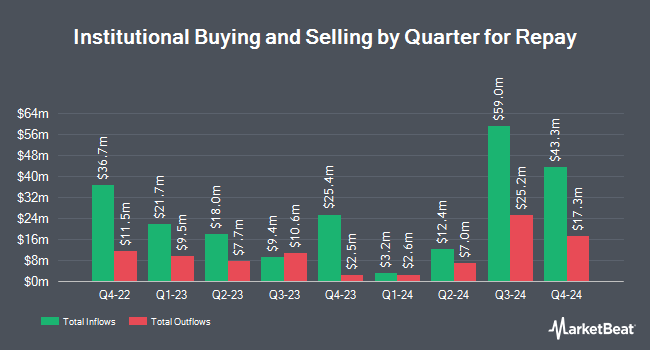AlphaQuest LLC lessened its holdings in shares of Repay Holdings Corporation (NASDAQ:RPAY - Free Report) by 89.5% in the first quarter, according to its most recent 13F filing with the Securities and Exchange Commission. The institutional investor owned 7,348 shares of the company's stock after selling 62,513 shares during the quarter. AlphaQuest LLC's holdings in Repay were worth $41,000 as of its most recent SEC filing.
A number of other hedge funds and other institutional investors have also bought and sold shares of RPAY. Tower Research Capital LLC TRC increased its stake in Repay by 815.5% during the 4th quarter. Tower Research Capital LLC TRC now owns 18,429 shares of the company's stock valued at $141,000 after purchasing an additional 16,416 shares in the last quarter. Price T Rowe Associates Inc. MD increased its stake in Repay by 15.5% during the 4th quarter. Price T Rowe Associates Inc. MD now owns 34,600 shares of the company's stock valued at $264,000 after purchasing an additional 4,635 shares in the last quarter. Northern Trust Corp increased its stake in Repay by 3.9% during the 4th quarter. Northern Trust Corp now owns 850,911 shares of the company's stock valued at $6,492,000 after purchasing an additional 32,079 shares in the last quarter. Jane Street Group LLC increased its stake in Repay by 21.4% during the 4th quarter. Jane Street Group LLC now owns 60,911 shares of the company's stock valued at $465,000 after purchasing an additional 10,745 shares in the last quarter. Finally, BNP Paribas Financial Markets bought a new stake in Repay during the 4th quarter valued at $1,532,000. Institutional investors own 82.73% of the company's stock.
Analysts Set New Price Targets
Several analysts have recently issued reports on RPAY shares. Wall Street Zen upgraded shares of Repay from a "hold" rating to a "buy" rating in a research note on Saturday, August 16th. Keefe, Bruyette & Woods upped their target price on shares of Repay from $5.00 to $5.75 and gave the stock a "market perform" rating in a research note on Tuesday, August 12th. DA Davidson reduced their target price on shares of Repay from $12.00 to $10.00 and set a "buy" rating for the company in a research note on Wednesday, August 13th. Canaccord Genuity Group reiterated a "buy" rating and issued a $12.00 target price on shares of Repay in a research note on Friday, August 22nd. Finally, UBS Group upped their target price on shares of Repay from $4.50 to $5.75 and gave the stock a "neutral" rating in a research note on Wednesday, August 13th. Four analysts have rated the stock with a Buy rating and five have issued a Hold rating to the company. According to data from MarketBeat, Repay currently has a consensus rating of "Hold" and a consensus price target of $7.22.
Check Out Our Latest Stock Report on Repay
Repay Stock Performance
RPAY traded down $0.30 during trading on Wednesday, hitting $5.66. 685,007 shares of the company traded hands, compared to its average volume of 824,298. The firm has a market cap of $516.98 million, a P/E ratio of -4.49 and a beta of 1.62. The stock's fifty day moving average is $5.33 and its 200 day moving average is $5.12. The company has a quick ratio of 0.85, a current ratio of 0.85 and a debt-to-equity ratio of 0.44. Repay Holdings Corporation has a one year low of $3.59 and a one year high of $9.75.
Repay (NASDAQ:RPAY - Get Free Report) last posted its quarterly earnings results on Monday, August 11th. The company reported $0.20 earnings per share for the quarter, meeting the consensus estimate of $0.20. The company had revenue of $75.63 million during the quarter, compared to analyst estimates of $74.24 million. Repay had a negative net margin of 35.79% and a positive return on equity of 8.89%. The firm's revenue for the quarter was up .9% on a year-over-year basis. During the same quarter in the prior year, the business earned $0.22 earnings per share. As a group, equities analysts predict that Repay Holdings Corporation will post 0.72 EPS for the current fiscal year.
Repay Company Profile
(
Free Report)
Repay Holdings Corporation, payments technology company, provides integrated payment processing solutions to industry-oriented markets in the United States. It operates through two segments: Consumer Payments and Business Payments. The company's payment processing solutions enable consumers and businesses to make payments using electronic payment methods.
Featured Articles

Before you consider Repay, you'll want to hear this.
MarketBeat keeps track of Wall Street's top-rated and best performing research analysts and the stocks they recommend to their clients on a daily basis. MarketBeat has identified the five stocks that top analysts are quietly whispering to their clients to buy now before the broader market catches on... and Repay wasn't on the list.
While Repay currently has a Hold rating among analysts, top-rated analysts believe these five stocks are better buys.
View The Five Stocks Here

We are about to experience the greatest A.I. boom in stock market history...
Thanks to a pivotal economic catalyst, specific tech stocks will skyrocket just like they did during the "dot com" boom in the 1990s.
That’s why, we’ve hand-selected 7 tiny tech disruptor stocks positioned to surge.
- The first pick is a tiny under-the-radar A.I. stock that's trading for just $3.00. This company already has 98 registered patents for cutting-edge voice and sound recognition technology... And has lined up major partnerships with some of the biggest names in the auto, tech, and music industry... plus many more.
- The second pick presents an affordable avenue to bolster EVs and AI development…. Analysts are calling this stock a “buy” right now and predict a high price target of $19.20, substantially more than its current $6 trading price.
- Our final and favorite pick is generating a brand-new kind of AI. It's believed this tech will be bigger than the current well-known leader in this industry… Analysts predict this innovative tech is gearing up to create a tidal wave of new wealth, fueling a $15.7 TRILLION market boom.
Right now, we’re staring down the barrel of a true once-in-a-lifetime moment. As an investment opportunity, this kind of breakthrough doesn't come along every day.
And the window to get in on the ground-floor — maximizing profit potential from this expected market surge — is closing quickly...
Simply enter your email below to get the names and tickers of the 7 small stocks with potential to make investors very, very happy.
Get This Free Report
Like this article? Share it with a colleague.
Link copied to clipboard.